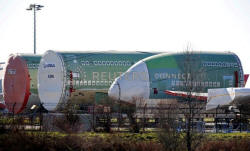Europe's Detroit? Pandemic bursts Toulouse aerospace
bubble
 Send a link to a friend
Send a link to a friend
 [June 08, 2020] By
Johanna Decorse [June 08, 2020] By
Johanna Decorse
TOULOUSE (Reuters) - Barely three months
ago, Serge Dumas had one problem: how to keep up with record demand for
the metal fasteners and bolts his small aerospace supply firm
manufactures just north of Toulouse.
Now, the head of Gillis Aerospace is wondering how to keep his 45
employees busy as Europe's aerospace capital reels from plummeting
jetliner demand caused by the coronavirus crisis.
"In February, we were in the midst of euphoria and operating a
just-in-time schedule," Dumas said, referring to the drum beat of a
fully-stretched aerospace supply chain.
"In a few days, we went from accelerating flat-out to slamming on the
brakes. We were flabbergasted."
Now his company, which recently partnered with Germany's Boellhoff
Group, has suspended an 800,000-euro ($906,700) investment in a new
building and machinery.
Gillis Aerospace, with annual revenues of 5 million euros, is one of
thousands of small to medium-sized firms hurt by the crisis as the
French government and private lenders finalise a 1-billion-euro fund to
help the sector.
Across the surrounding Occitanie region, a total of 40,000 aerospace
jobs are seen at risk, up to half of which could involve Airbus, based
in regional capital Toulouse.

Once basking in wealth from air transport, France's fourth largest city
is alarmed by whispers that it could suffer a fate similar to Detroit,
ravaged by recession in the auto industry.
Although Europe's social safety net is stronger, Detroit's experience
highlights a pressing issue: how a city built around a single industry
can spiral into decline when that sector is hit by economic disruption.
Four think-tanks and associations sounded the alarm in May, warning the
area could succumb to "Detroit Syndrome". They noted, though, that
Airbus - flush with orders with rival Boeing <BA.N> weakened by the
grounding of its 737 MAX - had avoided the kinds of strategic mistakes
that worsened the plight of U.S. automakers.
Just as Toulouse is now in France, Detroit was once one of the
wealthiest American cities. But after decades of job cuts and auto
factory closures, the Midwest city's population of below 700,000 is less
than half its 1950 peak, and many residents live in poverty.
"Right now, aerospace sub-contracting represents 86,000 jobs in
Occitanie and Airbus buys 5-billion-euros of parts locally," said Alain
Di Crescenzo, president of Occitanie's Industrial Chamber of Commerce (CCI).
Planemakers employ another 30,000.
"When Airbus coughs, everyone gets sick," he said.
CCI estimates Airbus will halve parts procurement this year. For
suppliers paying off loans, such cuts could be devastating.
[to top of second column] |

Sections of Airbus A380 are seen outside the Airbus A380 final
assembly line site at Airbus headquarters in Blagnac, near Toulouse,
France February 14, 2019. REUTERS/Regis Duvignau/File Photo

"Halving activity equates to 40,000 direct jobs locally and the same again for
indirect jobs," Di Crescenzo said.
Airbus declined comment.
'COLLECTIVE BLINDNESS'
Furthermore, it's crunch time for employers.
As France returns to some measure of normality after lockdowns,
government-supported furlough schemes will begin expiring and charges on
employers that have been waived could start rising from July.
"That's when the Detroit effect could kick in. If we don't do anything we could
kill the largest aerospace cluster in Europe," Di Crescenzo said.
Toulouse's aviation roots date back to World War I when local industrialist
Pierre-Georges Latecoere won a contract to build Salmson reconnaissance biplanes
for the French army.
The city pioneered international flights with Latecoere's legendary Aeropostale
airline and spawned the Caravelle, Concorde and the Airbus jets that now drive
its economy.
But the recent think-tank report by Fondation Copernic, Attac, Amis du Monde
diplomatique and Universite Populaire de Toulouse attacked "collective
blindness" that left it dependent on a single sector - one now facing its
worst-ever crisis
According to France's INSEE statistics office, French output shrank 33% in the
first weeks of the crisis, but the Toulouse area plunged by 38% due to its
reliance on aerospace.
The shock was all the more painful because the industry had record activity in
2019, said regional director Caroline Jamet.
The dominant role of a handful of manufacturers like Airbus means three out of
10 local suppliers rely on one main client.

The city's mayor, conservative Jean-Luc Moudenc, is worried about such disarray
in the short term. But, pitching himself as an aerospace champion in upcoming
elections, he dismisses fears that the city of half a million faces
Detroit-style decay.
Its factories hope to develop green aircraft of the future, he told Reuters,
adding: "Our firms have such know-how that they can diversify into other areas:
defence, medicine or energy."
(Writing and additional reporting by Tim Hepher and Joseph White; Editing by
Pravin Char)
[© 2020 Thomson Reuters. All rights
reserved.] Copyright 2020 Reuters. All rights reserved. This material may not be published,
broadcast, rewritten or redistributed.
Thompson Reuters is solely responsible for this content. |